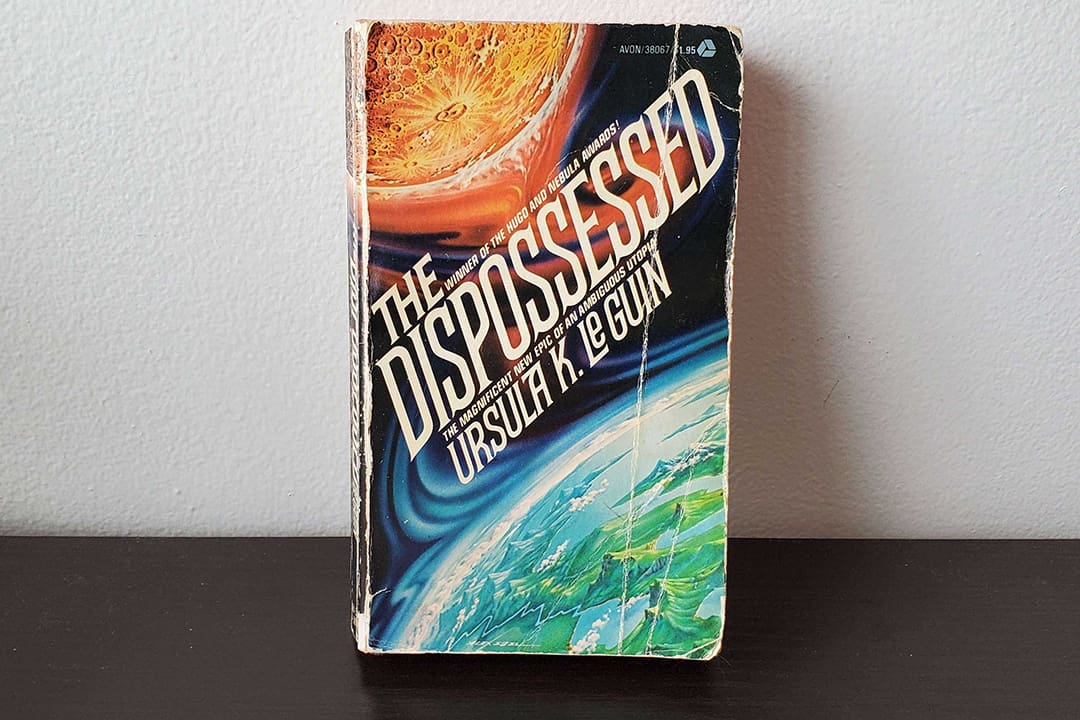Ursula Kroeber Le Guin’s The Dispossessed centres around Shevek, a genius physicist who stands out in an uncomfortable way in the anarchist utopia of the moon Anarres. Whether as an eight-year-old anticipating calculus without having ever heard of it, or as a 20-year-old student mentored so rigorously he is forced to live alone, Shevek is othered by his society. At the same time, he finds deep social and cultural comfort on his home moon.
When Shevek is moved to Urras, the parent planet for Anarres, his status as ‘other’ is revered. He wants to be an emissary of knowledge — a physicist who also dispels bad blood between the worlds. With him, there is hope for dialogue between Urras and Anarres through his bridging of Sequency — the notion that time is linear — and Simultaneity — that time is cyclical — theories in a Grand Temporal Theory. Still, Shevek still feels deeply out of place on Urras — he has no duty to society other than to do physics, and that itself makes his life all the more empty.
As a scientist, Shevek faces the impossible. He is under immense pressure to create a theory that unifies two completely different things, both in the world of physics and in attempting to create a stronger connection between Urras and Anarres.
His dilemma struck me as one that many scientists face, albeit on a less world-shifting level: how do we reckon with the implications of our research on society? What do we do when people don’t want to hear the answers that we have? It’s no secret that a range of scientists — from epidemiologists to climate scientists — have been forced to confront these questions more often as an increasing number of people become involved in discourse surrounding scientific research.
Contradictions of science and perfect societies
Rather than giving us a straight answer, Le Guin brings in even more contradictions. Her anarchist utopia isn’t quite perfect. It has bureaucracy, rumours of political suppression, and ‘othered’ people like Shevek. Not only does Anarres contain contradictions but a relationship between Anarres and Urras requires reconciling fundamentally different politico-economic views.
Urras is fraught with conflict that mirrors our planet’s during the Cold War era — unlikely to be a coincidence, as Le Guin completed this novel, which was originally a short story, due to her opposition to the Vietnam War. In Urras, the country A-Io, a parallel to propertied and patriarchal societies in our world, is on the brink of war with Thu, an authoritarian country in ideological opposition to A-Io. Meanwhile, Anarres is an anarcho-syndicalist society — a society where the workers have control of the means of production through a centralized union.
These conflicts are mirrored rather aptly in the physics conundrum Shevek faces — what to do when he reconciles a theory in which time is linear with a theory in which time is cyclical. When it turns out that combining Sequency and Simultaneity will be profitable for Urras, Shevek faces a dilemma. Releasing his united theory to the Urrasti would lead to profiteering, but he also has the rare opportunity to reconcile both worlds through his presence as an Anarresti on Urras.
This isn’t just a metaphor — it’s messier than that. Shevek’s dilemma is not one simply of resolving opposing theories, but also a dilemma about the ostracization of the study of Simultaneity theory from both Anarres and Urras — much like how Shevek is othered on both planets.
The contradictions aren’t meant to be weighed against each other to find the best theory. Nor are they meant to be destroyed, allowing us to have a theory that has no contradictions. No, Le Guin wants us to embrace the contradictions, live in them, and accept them. The solution isn’t to reject the other but to allow the other to exist in tandem with yourself.
When I think about how this applies to science, I think about the field I hold close to my heart: ecology. I have assisted in a few research projects, and each one came with a dozen or so dense papers from which I had to build my understanding from the ground up.
Although I never had to confront scientific tensions as pressing as Shevek has, I often had to understand concepts across vastly different disciplines. Sometimes, these disciplines weren’t in conversation with each other, and there weren’t always rigorously defined systems that connected the concepts, but that was the point! Part of the science was finding these connections, and learning how to do so proved invaluable in my current endeavour — philosophy.
Shevek’s journey is one that many of us can identify with. Feeling othered, facing seemingly irreconcilable tensions, and trying to balance the views you grow up with against your new experiences. A new day begins, and Sisyphus rolls the boulder up the hill again. But selfishly, I do want to believe that there is a place for the other, even if my place is here, talking about The Dispossessed with you.



No comments to display.